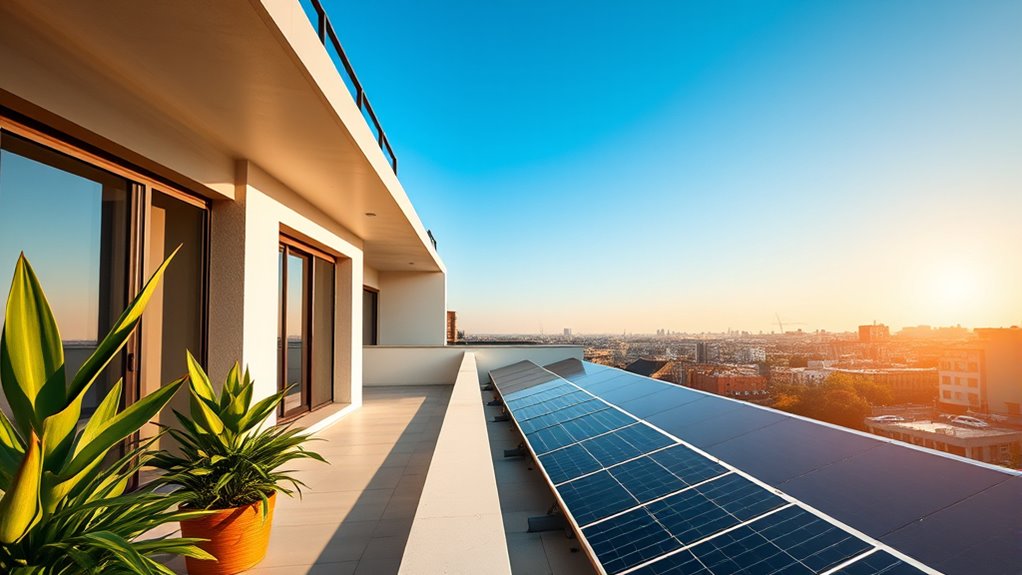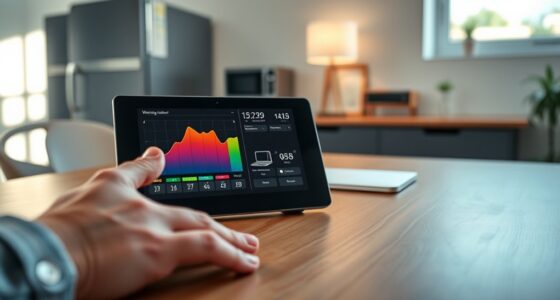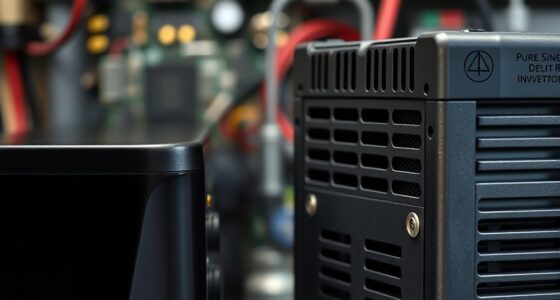Getting started with solar power in your apartment involves exploring options like shared solar programs or community solar projects that don’t require rooftop access. Check for local incentives such as tax credits or rebates that can lower costs. Coordinate with your building management or landlords to see if rooftop or ground-mounted systems are possible. A professional solar provider can help assess your energy needs and guide you through available programs, so you can start saving on energy costs efficiently.
Key Takeaways
- Explore shared solar programs or community solar options to participate without installing panels on your apartment.
- Research local incentives like tax credits, rebates, and net metering to reduce overall solar project costs.
- Coordinate with building management or landlords for rooftop access or shared solar system installations.
- Assess your energy usage to determine appropriate system size and potential savings.
- Consult with experienced solar providers to identify suitable solutions and navigate program requirements.

Installing solar power in apartments might seem challenging, but it’s more achievable than you think. While traditional home solar setups are straightforward, apartments often face unique hurdles like limited space or shared rooftops. Still, with the right approach, you can harness solar energy without owning a standalone house. One of the first steps is understanding the options available for solar panel installation tailored to apartment living. Many buildings now support or are open to installing shared solar systems, where multiple residents benefit from a single setup. If you don’t own your apartment, check whether your building management or homeowners’ association allows for solar upgrades or has existing plans. In some cases, you might consider community solar programs, which enable you to buy into a larger solar project and receive credits on your energy bill, even if you can’t install panels on your unit directly.
Another critical factor is exploring apartment solar incentives. These incentives can *considerably* reduce upfront costs and make adopting solar more affordable. Incentives vary by location but often include federal tax credits, state rebates, or local grants designed to promote renewable energy. Some regions also offer net metering programs that let you earn credits for excess energy your solar system generates and feeds back into the grid. To capitalize on these benefits, research local policies and speak with solar providers familiar with apartment-specific projects. They can help you *chart* the application process and identify available incentives that can lower your installation costs.
Explore incentives like tax credits, rebates, and net metering to make apartment solar more affordable.
When considering solar panel installation in an apartment, it’s essential to assess your building’s infrastructure. If your rooftop is accessible and suitable for solar panels, you might work with your landlord or building management to coordinate a system. If rooftop access isn’t feasible, exploring ground-mounted solar or community solar options becomes more practical. You should also evaluate your energy usage patterns to determine the size of the system you’ll need and estimate potential savings. Many providers offer virtual consultations that can tell you how much energy solar could generate based on your apartment’s location and orientation.
Finally, engaging with experienced solar installers who understand apartment-specific projects can streamline the process. They can help with site assessments, system design, and *steering* incentive programs. Remember, even if you don’t own the property outright, there are options to participate in solar energy, thanks to community programs and shared installations. With some research and collaboration, you can make your apartment more sustainable and enjoy the financial benefits of solar power sooner than you might expect.
Frequently Asked Questions
Can Renters Install Solar Panels Without Landlord Approval?
You generally can’t install solar panels without your landlord’s approval, as renters’ rights usually prevent permanent modifications. However, you can explore solar leasing options or portable solar solutions that don’t require installation or approval. Talk to your landlord about your interest in solar energy; they might support temporary or lease-based options that benefit both of you. Always check your lease agreement and local laws before proceeding.
What Are the Costs Involved in Apartment Solar Installations?
You might think solar installation costs are high, but financing options can make it affordable. Typically, you’ll face upfront costs for equipment and installation, but some programs cover part of these expenses. Many landlords or utility companies offer leasing or power purchase agreements, reducing your initial investment. By exploring these options, you can enjoy solar energy benefits without breaking the bank, making it easier to go green in your apartment.
Are There Government Incentives for Solar Power in Apartments?
Yes, you can benefit from government incentives for apartment solar power. Many regions offer apartment solar incentives and government rebate programs that make installing solar more affordable. You should check local, state, or federal programs for specific benefits available to your building. Applying for these incentives can considerably reduce your upfront costs, making solar power a more accessible option for your apartment.
How Do I Monitor My Apartment Solar Energy Production?
Think of your solar system as a busy garden, and energy monitoring as your diligent gardener. You can track your solar production using smart meters or dedicated apps linked to your inverter. These tools provide real-time data on energy production, helping you spot issues and optimize usage. By regularly checking your solar production tracking, you stay in control, ensuring your apartment’s solar garden flourishes and maximizes its energy yield.
What Are the Best Portable Solar Options for Apartments?
You should consider portable solar chargers from top brands like Anker, Renogy, or Goal Zero, as they’re reliable and easy to carry. These chargers are perfect for powering small devices or backup energy. Look for models with high wattage and foldable designs to maximize portability. Always check reviews and compatibility with your devices to guarantee you get the best solar panel brands and portable solar chargers for your apartment needs.
Conclusion
Getting started with solar power in your apartment is like planting a seed for a greener future—small steps today can grow into big savings and environmental impact tomorrow. While it might seem intimidating at first, exploring options like portable panels or community shares makes it doable. Remember, each effort is a brushstroke in the canvas of sustainability, turning your home into a beacon of change. Embrace the journey; your solar adventure is just beginning.









